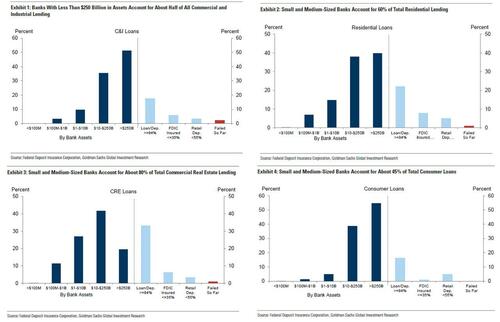
By Peter Tchir of Academy Securities
If the morning headlines are any indication, it is going to take a lot of coffee to make it through a long day at the end of a long week. Since I average about 1 T-Report for every 2 to 3 cups of coffee, it could be a long day for you, the readers!
UBS Announces Offer to Buy CS
The FT reported that UBS offered to buy CS for 0.25 Swiss Francs per share. There was also a line in the report stating that a Material Adverse Change Clause (MAC) was linked to UBS CDS spreads widening by 100 bps. I for one, haven’t seen a MAC clause linked to CDS spreads.
There are also headlines that CS is “said to push back” against UBS’s offer.
Bear Stearns and JPM Morgan
When that deal hit the tape it was a fait accompli. There was little to no doubt a deal was getting done. The price of $2 dollars may have seemed low (and it got changed over time), but there was clarity that a deal was done (I keep harping back to the language that JPM was guaranteeing/taking over the Bear Stearns swap books, regardless of whether the deal closed or not). That is in stark comparison to headlines crossing the tape right now where, there is significant uncertainty.
The CDS MAC Clause
It is only one line in the FT’s report, that said the deal include at MAC clause linked to UBS CDS going 100 bps wider.
What we don’t know about the clause:
-
What maturity CDS? Assuming the 5-year as it is typically most liquid.
-
How Is CDS measured? Is it if it trades 100 wider once? Closes above 100 wider? Some number of trades or notional go through at more than 100 wider?
-
What is the base CDS spread? UBS 5-year CDS averaged 68 bps this year. It was 71 bps last Friday, but closed at 133 bps this past Friday, as markets started to price in the probability that UBS would buy CS and subsume a lot of existing debt.
-
How long does this MAC exist for? Is it a Monday only MAC? Does it last for a few days? Weeks? Months? Somewhere between a few days and a week or so seems “about right” to me, but we don’t know.
A weird “game theory” dynamic
For now we can talk generically about 100 bps wider, without knowing the details, as it helps (though I’m assuming in my own thought process 100 bps wider from something lower than Friday’s close, that lasts about a week, before falling off).
-
CS bond holders want to sell UBS protection. If you are a CS bond holder, especially if you were a subordinated debt holder, or even lower down in the cap structure, you want this deal to go through. Europe is busy trading this morning, and I’m hearing that some Jr. Sub paper is trading up from around 30 points to nearly 60 (this bond was basically 90 the week before). One reason CDS, from a “game theory” perspective shouldn’t go 100 wider.
-
Buying up 100 bps seems “counterproductive”. Even if you think UBS is overpaying and taking on too much risk, driving the CDS spread 100 bps wider is incredibly counterproductive. At 99 bps there would be a deal (if CS agrees to the terms) but at 100 bps, in theory, no deal, so UBS should scream back tighter. To pay 100 bps higher, you almost have to believe the deal gets done no matter what, with no additional support (seems unlikely) or that even if the deal doesn’t get consummated, the CDS only tightens back a little bit. Another reason from a “game theory” viewpoint for it not to go 100 wider.
-
Where do generic banks spreads trade without a deal? If you think that bank spreads in general in Europe will widen with no deal, then you can bid up UBS CDS more easily. If you think there is a “contagion” type of risk, where with no UBS deal, the market looks to identify the next set of banks to go after, and that will cause even the biggest and safest banks to widen, then maybe the risk reward of paying up 100 bps changes.
-
What does the clause tell us, if anything? While CS has allegedly pushed back saying the price is too high, I think from a “game theory” perspective, UBS included this clause as a safeguard, in case the market thinks they are missing something in their valuation. It does not inspire confidence in the deal, which may weigh on bank spreads even with an apparent solution.
More From the Government?
-
Will the Swiss government or central bank have to step up with additional backstops? Maybe even capital injections? Who knows, but they are caught in the middle of this and will be pushed hard to deliver more.
Europe Solved?
No. Not by a long shot. I’m sure there will be another T-Report later today as headlines are coming fast and furious (the WSJ just reported that CS AT1’s will face a haircut). From a pure “absolute priority of payment”, many may have assumed that is equity gets money, the AT1 should not be impaired, and anyone working on that assumption might have to rethink other positions in other institutions.
One question, that I think people had hoped would be put to rest this weekend, is “if CS is solved, can European markets move on?”
For those of you who lived through the GFC and European Debt Crisis, the memories of “epic turning points” that sometimes lasted less than 24 hours is still scarred on our psyche. What is going on so far, does not inspire the greatest confidence, at least not for me, that we can rally and not look back, but the day is young!
All Quiet on the U.S. Front
As we sent in a Bloomberg IP on Friday, a “plane tracker” reported on twitter that a lot of private jets were showing up in Omaha. There are stories that Buffett is talking to Biden. He was very involved in the GFC, taking direct positions and indirectly supporting companies with his “seal of approval”. Will that be the case this time? Will it work?
I saw a headline that some banks were pushing for a “temporary” (in this case 2-year) extension of FDIC insurance to all deposits of any size. As written yesterday, in Gasp, Gup, Glug, I think we need much broader deposit insurance to stabilize the situation.
That will give us the breathing room to get capital infusions where necessary.
Smaller banks, well below Wall Street’s radar, are bearing the brunt of this and that can become problematic for the economy. As as reminder "small, Medium Banks Account For 50% Of C&I Lending, 45% Of Consumer Lending And 80% Of All Commercial Real Estate Lending."
Bottom Line
The day is young, the coffee is flowing, and there is a lot more time to see some truly positive and supportive news before U.S. futures open at 6 pm EST. or the cash markets open here at 9:30 am EST.
So I am optimistic we see more done and am looking forward to being on Bloomberg TV tonight at 6:30 pm as they ramp up special coverage of the global banking industry!
By Peter Tchir of Academy Securities
If the morning headlines are any indication, it is going to take a lot of coffee to make it through a long day at the end of a long week. Since I average about 1 T-Report for every 2 to 3 cups of coffee, it could be a long day for you, the readers!
UBS Announces Offer to Buy CS
The FT reported that UBS offered to buy CS for 0.25 Swiss Francs per share. There was also a line in the report stating that a Material Adverse Change Clause (MAC) was linked to UBS CDS spreads widening by 100 bps. I for one, haven’t seen a MAC clause linked to CDS spreads.
There are also headlines that CS is “said to push back” against UBS’s offer.
Bear Stearns and JPM Morgan
When that deal hit the tape it was a fait accompli. There was little to no doubt a deal was getting done. The price of $2 dollars may have seemed low (and it got changed over time), but there was clarity that a deal was done (I keep harping back to the language that JPM was guaranteeing/taking over the Bear Stearns swap books, regardless of whether the deal closed or not). That is in stark comparison to headlines crossing the tape right now where, there is significant uncertainty.
The CDS MAC Clause
It is only one line in the FT’s report, that said the deal include at MAC clause linked to UBS CDS going 100 bps wider.
What we don’t know about the clause:
-
What maturity CDS? Assuming the 5-year as it is typically most liquid.
-
How Is CDS measured? Is it if it trades 100 wider once? Closes above 100 wider? Some number of trades or notional go through at more than 100 wider?
-
What is the base CDS spread? UBS 5-year CDS averaged 68 bps this year. It was 71 bps last Friday, but closed at 133 bps this past Friday, as markets started to price in the probability that UBS would buy CS and subsume a lot of existing debt.
-
How long does this MAC exist for? Is it a Monday only MAC? Does it last for a few days? Weeks? Months? Somewhere between a few days and a week or so seems “about right” to me, but we don’t know.
A weird “game theory” dynamic
For now we can talk generically about 100 bps wider, without knowing the details, as it helps (though I’m assuming in my own thought process 100 bps wider from something lower than Friday’s close, that lasts about a week, before falling off).
-
CS bond holders want to sell UBS protection. If you are a CS bond holder, especially if you were a subordinated debt holder, or even lower down in the cap structure, you want this deal to go through. Europe is busy trading this morning, and I’m hearing that some Jr. Sub paper is trading up from around 30 points to nearly 60 (this bond was basically 90 the week before). One reason CDS, from a “game theory” perspective shouldn’t go 100 wider.
-
Buying up 100 bps seems “counterproductive”. Even if you think UBS is overpaying and taking on too much risk, driving the CDS spread 100 bps wider is incredibly counterproductive. At 99 bps there would be a deal (if CS agrees to the terms) but at 100 bps, in theory, no deal, so UBS should scream back tighter. To pay 100 bps higher, you almost have to believe the deal gets done no matter what, with no additional support (seems unlikely) or that even if the deal doesn’t get consummated, the CDS only tightens back a little bit. Another reason from a “game theory” viewpoint for it not to go 100 wider.
-
Where do generic banks spreads trade without a deal? If you think that bank spreads in general in Europe will widen with no deal, then you can bid up UBS CDS more easily. If you think there is a “contagion” type of risk, where with no UBS deal, the market looks to identify the next set of banks to go after, and that will cause even the biggest and safest banks to widen, then maybe the risk reward of paying up 100 bps changes.
-
What does the clause tell us, if anything? While CS has allegedly pushed back saying the price is too high, I think from a “game theory” perspective, UBS included this clause as a safeguard, in case the market thinks they are missing something in their valuation. It does not inspire confidence in the deal, which may weigh on bank spreads even with an apparent solution.
More From the Government?
-
Will the Swiss government or central bank have to step up with additional backstops? Maybe even capital injections? Who knows, but they are caught in the middle of this and will be pushed hard to deliver more.
Europe Solved?
No. Not by a long shot. I’m sure there will be another T-Report later today as headlines are coming fast and furious (the WSJ just reported that CS AT1’s will face a haircut). From a pure “absolute priority of payment”, many may have assumed that is equity gets money, the AT1 should not be impaired, and anyone working on that assumption might have to rethink other positions in other institutions.
One question, that I think people had hoped would be put to rest this weekend, is “if CS is solved, can European markets move on?”
For those of you who lived through the GFC and European Debt Crisis, the memories of “epic turning points” that sometimes lasted less than 24 hours is still scarred on our psyche. What is going on so far, does not inspire the greatest confidence, at least not for me, that we can rally and not look back, but the day is young!
All Quiet on the U.S. Front
As we sent in a Bloomberg IP on Friday, a “plane tracker” reported on twitter that a lot of private jets were showing up in Omaha. There are stories that Buffett is talking to Biden. He was very involved in the GFC, taking direct positions and indirectly supporting companies with his “seal of approval”. Will that be the case this time? Will it work?
I saw a headline that some banks were pushing for a “temporary” (in this case 2-year) extension of FDIC insurance to all deposits of any size. As written yesterday, in Gasp, Gup, Glug, I think we need much broader deposit insurance to stabilize the situation.
That will give us the breathing room to get capital infusions where necessary.
Smaller banks, well below Wall Street’s radar, are bearing the brunt of this and that can become problematic for the economy. As as reminder “small, Medium Banks Account For 50% Of C&I Lending, 45% Of Consumer Lending And 80% Of All Commercial Real Estate Lending.”
Bottom Line
The day is young, the coffee is flowing, and there is a lot more time to see some truly positive and supportive news before U.S. futures open at 6 pm EST. or the cash markets open here at 9:30 am EST.
So I am optimistic we see more done and am looking forward to being on Bloomberg TV tonight at 6:30 pm as they ramp up special coverage of the global banking industry!
Loading…





